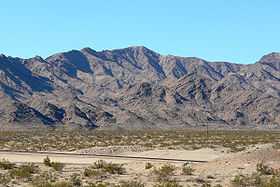Dead Mountains
| Dead Mountains | |
|---|---|
 Seen from Needles Highway-(I-40) | |
| Highest point | |
| Peak | Mount Manchester |
| Elevation | 1,097 m (3,599 ft) |
| Dimensions | |
| Length | 11 mi (18 km) N-S |
| Width | 5 mi (8.0 km) E-W-(widest at north) |
| Geography | |
<div style="padding:2px 2px 5px 2px;> | |
| Country | United States |
| State | California |
| Region |
(southeast)-Mojave Desert (Lower Colorado River Valley) |
| District | San Bernardino County |
| Settlement | Needles, CA–Mohave Valley, AZ |
| Range coordinates | 35°01′40″N 114°44′56″W / 35.0278°N 114.7489°WCoordinates: 35°01′40″N 114°44′56″W / 35.0278°N 114.7489°W |
| Borders on |
Newberry Mountains (Nevada)-N Piute Valley & Wash-W & S Colorado River-E Interstate 40 in California-S |
| Topo map | USGS Mount Manchester |
The Dead Mountains are a mountain range in the southeastern Mojave Desert, in San Bernardino County, California.[1] The range borders the tri-state intersection of Nevada, Arizona and California, and the Mohave Valley, with the Fort Mojave Indian Reservation bordering the range foothills on the east and northeast, in the three states.
Geography
The Dead Mountains are 12 miles (19 km) northwest of Needles, California. They border the Colorado River on the east, and the Piute Wash of the Piute Valley on the west. Piute wash drains south, then turns east for 8 mi at the south of the range to meet the Colorado River.
Mount Manchester is the highest point at 3,598 feet (1,097 m).[2]
Dead Mountains Wilderness
The rust colored mountains, which cover forty six thousand seven hundred fifty eight acres were designated the Dead Mountains Wilderness in 1994 by the United States Congress. They are maintained by the Bureau of Land Management.[3] The vegetation is mostly creosote bush and desert wash scrub. The California Desert Conservation Area [4] is located within the wilderness and Smoke trees are found there.
The wildlife found on the mountains includes coyote, a small herd of bighorn sheep, rattlesnakes, falcons, hawks, eagles. A portion of the wilderness is critical habitat for the endangered Desert Tortoise.[5][6]
See also
- Category: Flora of the California desert regions
- Category: Mountain ranges of the Mojave Desert
- Category: Protected areas of the Mojave Desert
References
| Wikimedia Commons has media related to Dead Mountains. |